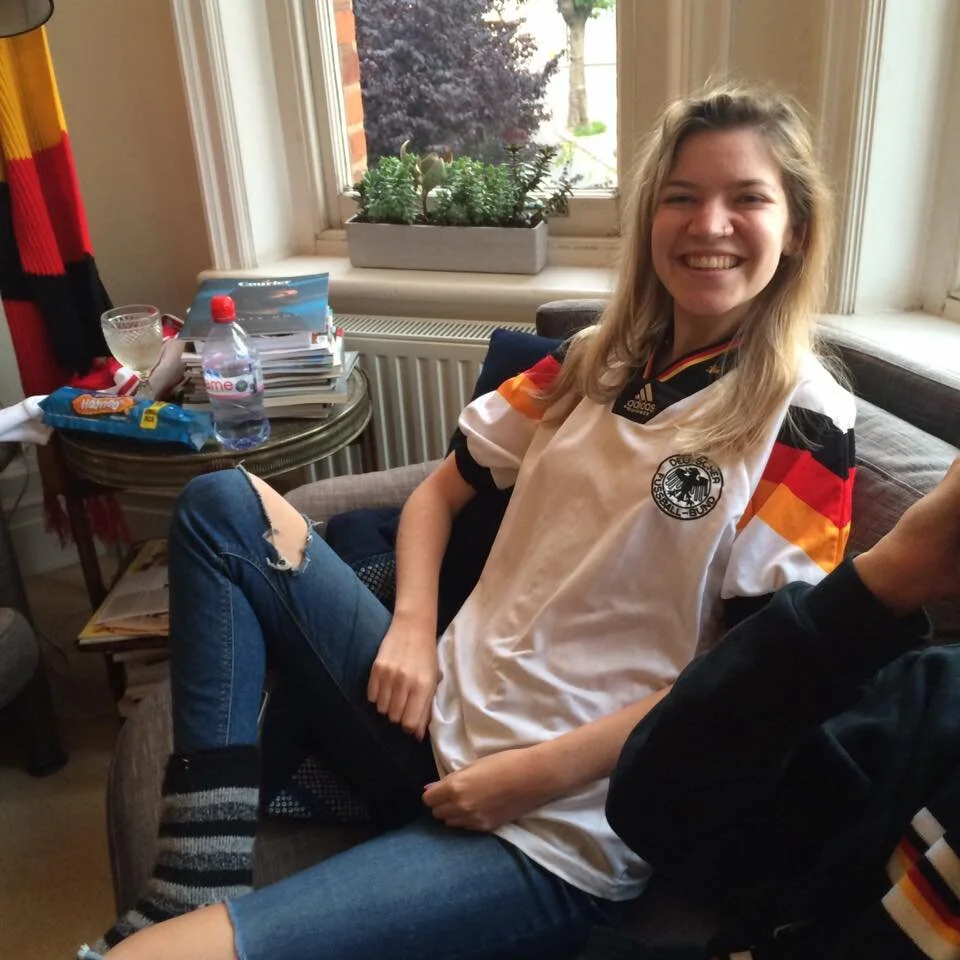Reflecting On How The 2019 World Cup Helped Me Accept My Queerness
The 2019 Women’s World Cup was gay. It was gay in an out-and-proud, unapologetically loud way – US captain Megan Rapinoe telling the world that you can’t win a championship without gays on your team, ‘Science, right there,’ she said. But it was gay in a quieter way as well. For the 40 publicly queer women competing in the tournament (and those watching them), representing everywhere from Norway to Argentina to New Zealand, playing the best football they could, their sexuality was neither the most important aspect about them, nor something to be hidden away either.
The tournament was a revelation to me. I’ve watched football all my life. I inherited a deep devotion to the German national team from my German father who raised me on stories of the West Germany World Cup triumphs of 1974 and 1990. We watched legends like Oliver Kahn and Michael Ballack. Impatiently awaited every football summer, praying to the football gods for victory, my dad hiding behind furniture when the time came for penalties. I have lived through the various agonies and elations that go hand-in-hand with pinning your hopes and dreams to a group of 11 players kicking a ball around a pitch for 90 minutes.
There are few moments in life like Toni Kroos’s 95th minute free kick goal against Sweden to keep Germany’s 2018 World Cup hopes alive. Moments when everything you are wishing for in that exact second comes true. The rest of the tournament, a series of increasingly disappointing let-downs and losses which saw the reigning champions finish last in their group, was a good lesson in humility, a reminder of fate’s fickle nature. I have countless memories of the men’s game, endless memorabilia from silly hats to signed football cards.
The author, in her Germany kit.
Before this past summer, however, I’m sorry to report that women’s football wasn’t something I had given much thought to. And then suddenly it was. The energy around the tournament was undeniable and I couldn’t help but get sucked in. As I joined the record-setting 400 million people who watched the Women’s World Cup last year, many, like me, for the first time, I was struck by the quality of play and by the unprecedented sense of occasion surrounding a women’s sporting event. And then, as I grew from a casual viewer into an invested fan, I became aware of how very gay it was.
There was Rapinoe, of course, but also Holland’s Vivianne Miedema and Daniëlle van de Donk, Australia’s Sam Kerr, Spain’s Mapi Leon, Brazil’s Marta, Sweden’s Magdalena Eriksson. Some of the greatest players of the game were being celebrated and championed on a world stage and they were proudly, openly queer. As a lesbian, it was powerful to see. Until then, football had never been something that I associated with my sexuality one way or the other.
I hadn’t felt particularly inspired nor pressured by the men’s game to present in a certain way. But here, in women’s football, I found a culture where it was normal to be gay. Where queer women weren’t an anomaly, weren’t pigeon-holed. It was thrilling and incredibly validating.
“As I grew from a casual viewer into an invested fan, I became aware of how very gay the women’s World Cup was.”
This is not to say that the World Cup or women’s football as a whole is a queer utopia. I can’t speak on the atmosphere within the teams or the pressures players might feel from governing bodies or endorsement partners to present as straight. You only need to look at US national players Ashlyn Harris and Ali Krieger, who hid their 10-year relationship from the public until last year, to know there are still deeply felt fears within the sport. But from a fan’s perspective, those internal conflicts didn’t reach me.
What did reach me was Miedema, the Netherlands’ all-time top scorer, casually correcting an interviewer’s assumption that the person she was in a relationship with was a man. It was Kelly O’Hara kissing her girlfriend without fanfare, without being publicly out, after winning the World Cup. A behind-the-scenes clip of Real Betis’s Ana Romero surprising her girlfriend Dutch national player Merel van Dongen before the final with a kiss as her teammates walk past completely unfazed.
Watching those moments I felt some of the internalised homophobia and shame that I had been carrying with me fall away. Shame built up over years of microaggressions and casual homophobia, of bearing witness to the violence and the hate directed towards the LGBTQ+ community globally, of the enduring, damaging narratives of the predatory dyke, the pathetic lesbian. For many years, I turned it all inwards, I carried it with me – manifested first as denial, fear, secrecy, then as an uneasiness with myself, an anxiety of making those around me uncomfortable.
The World Cup lessened that weight. Seeing these players’ sexuality accepted in such a natural, unspoken way, within a sport so familiar to me, helped normalise my own sexuality in a way that I never had before. In these women I saw myself reflected and I saw how easy things could be. Half the team was straight, half the team was gay and it didn’t matter either way. And in this casual visibility I found hope and healing. And I’m not alone.
‘Having openly queer women in women’s football is an enormous source of validation for me,’ says Victoria Salinero-Bevins, 18, who runs a popular women’s football tumblr account and plays football (‘casually’) herself. Victoria says that she had never come across a sport or fan community with so many openly out people and where queer representation was as widespread and as normalised.
‘These women are living open and unapologetic queer lives and although I’m at a point in life where I can say that I’m pretty secure about my gayness, there’s still a part of me that resists talking about it too much and there’s still definitely a lack of queer representation around me. Therefore, to have this visibility where there’s so many of them, where it’s so normalised and so accepted is very reassuring and connects with me on a deeper level.’
On the flip side to this positivity, however, is a fear that visibility will only heighten and perpetuate stereotypes around women in sports that damage and dissuade young girls from wanting to play. For many female athletes growing up, ‘tomboy’ and then ‘lesbian’ are words weaponised against them, used as an insult to attack first their gender and then their sexuality, enforcing the idea that sport is something for the boys only.
‘There’s still a lot of close-minded people who will use [queer players] as ammunition in trying to discredit women’s football and even deter their children, especially young girls, from being a part of it,’ says Ciara Monahan, Clapton CFC captain, Goal Diggers FC coach, and Football Beyond Borders practitioner. ‘Some parents have very binary ideas about gender and sexuality and won’t want their daughters to play football and get into sport because it’s seen as masculine and has those negative associations. There’s a fear of being in queer spaces.’
For Ciara, playing football at university was the first time she had experienced an openly queer space herself and it had a huge impact on her own coming out journey in a very positive way. But her experiences on the pitch and working with young people as part of FBB has led her to be wary of being too idealistic. ‘I’m thrilled to see people like Megan Rapinoe having a platform and a space. I’ve been playing football since I was six years old and I feel like I’ve been waiting 20 years to see this happen,’ she says. ‘The optimist in me would really hope [LGBTQ+ normalisation] would be an outcome. But I’m still cautious because of the nature of the world.’
“I’ve been playing football since I was six years old and I feel like I’ve been waiting 20 years to see this happen.”
To work towards changing these fears of women in sports, Ciara says more openness and education is needed for parents and coaches around sexuality and queerness. It is their job to open up those conversations and find practical ways to ensure safe spaces within football. ‘At Goal Diggers FC, we introduce ourselves and our pronouns as standard procedure, it's small but effective. We create a space where the notion that gender isn't binary, where you can be gender non-conforming, is just the norm and anyone that plays for the club should clearly understand that this is the space they are in.’
It’s now been a year since the women’s World Cup. In that time, I’ve become more open in my life and in my work, writing more freely about queer issues and interests, even getting a piece picked up by lesbian media (hi, Autostraddle!). And I’d like to think that there’s a newfound ease with which I carry myself.
After the unprecedented media attention and high profile generated from the tournament, it felt like the momentum of women’s football continued forward. I started attending consistently sold-out Arsenal WSL matches with my brother and whichever of my friends I could convince to come spend a Sunday afternoon in Borehamwood with me and Vivianne Miedema, my heart feeling a little fuller for every rainbow scarf spotted in the crowd.
Of course, that had to pause as football around the world ground to a halt along with everything else amidst this pandemic and, as we now know, the WSL will not be continuing this season. Who knows when it will be safe for the public to start attending matches again. But I truly hope that when life returns to normal, whatever that may look like, that the gains made in women’s football this past year are not lost.
As it grows in prominence, women’s football has the chance to cement itself as a space that celebrates and thrives on inclusivity and that champions all women, gay or straight. Not only the men’s game, but those outside of football as well, can look to women’s as an example of how sport can be elevated by its queer people.
Back in June 2019, I took one look at Germany’s Dzsenifer Marozsán and decided women’s football was definitely for me. I had no idea how it would go on to help me. And while I’m still working through those deep-rooted feelings of shame and anxiety that manifest themselves from internalised homophobia, the World Cup gave me some hope and some light and that can be hard to come by these days.
Words and self-portrait Alex Peters




